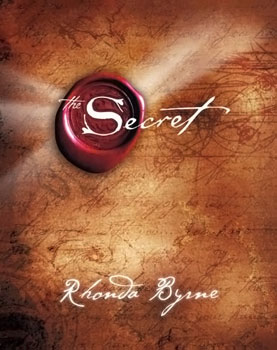The Secret (Byrne book)
The Secret is a 2006 self-help book by Rhonda Byrne, based on the earlier film of the same name. It is based on the belief in the law of attraction, which claims that thoughts can change a person's life directly. The book has sold 30 million copies worldwide and has been translated into 50 languages.
Overview[edit | edit source]
The Secret presents the law of attraction as a natural law that dictates that the universe grants people's thoughts, feelings, and beliefs, whether positive or negative. Byrne emphasizes the power of positive thinking, claiming that if you think positively, you will attract positive outcomes into your life. Conversely, negative thoughts will attract negative outcomes.
The book is divided into several chapters, each focusing on how the law of attraction applies to a different aspect of life, such as wealth, health, and relationships. Byrne provides anecdotes and quotes from individuals she considers to be successful practitioners of the law of attraction, including historical figures and modern-day teachers.
Reception[edit | edit source]
The Secret received mixed reviews from critics. Supporters praised the book for its motivational aspects and its potential to inspire positive change in people's lives. Critics, however, dismissed it as pseudoscience, arguing that it oversimplifies complex psychological and sociological issues and can lead people to blame themselves for events outside their control, such as illnesses and accidents.
Despite the criticism, The Secret has been a commercial success, leading to the creation of an entire franchise, including sequels, a daily teachings app, and merchandise. It has also influenced popular culture, inspiring parodies, references in television shows, and discussions about the effectiveness and ethics of the law of attraction.
Sequels and Related Works[edit | edit source]
Following the success of The Secret, Byrne released several related books, including The Power, The Magic, and Hero, each expanding on the concepts introduced in the original book and applying them to new areas of life.
Criticism and Controversy[edit | edit source]
Critics of The Secret and the law of attraction argue that the concept is scientifically unfounded and that it can lead to victim-blaming in situations of failure or misfortune. They also point out the danger of substituting positive thinking for action and realistic planning in achieving personal goals.
In Popular Culture[edit | edit source]
The Secret has been referenced in various media, including television shows, films, and online content, often in a satirical context. Its impact on popular culture reflects its widespread recognition and the polarizing opinions it generates.
See Also[edit | edit source]
Search WikiMD
Ad.Tired of being Overweight? Try W8MD's physician weight loss program.
Semaglutide (Ozempic / Wegovy and Tirzepatide (Mounjaro / Zepbound) available.
Advertise on WikiMD
|
WikiMD's Wellness Encyclopedia |
| Let Food Be Thy Medicine Medicine Thy Food - Hippocrates |
Translate this page: - East Asian
中文,
日本,
한국어,
South Asian
हिन्दी,
தமிழ்,
తెలుగు,
Urdu,
ಕನ್ನಡ,
Southeast Asian
Indonesian,
Vietnamese,
Thai,
မြန်မာဘာသာ,
বাংলা
European
español,
Deutsch,
français,
Greek,
português do Brasil,
polski,
română,
русский,
Nederlands,
norsk,
svenska,
suomi,
Italian
Middle Eastern & African
عربى,
Turkish,
Persian,
Hebrew,
Afrikaans,
isiZulu,
Kiswahili,
Other
Bulgarian,
Hungarian,
Czech,
Swedish,
മലയാളം,
मराठी,
ਪੰਜਾਬੀ,
ગુજરાતી,
Portuguese,
Ukrainian
Medical Disclaimer: WikiMD is not a substitute for professional medical advice. The information on WikiMD is provided as an information resource only, may be incorrect, outdated or misleading, and is not to be used or relied on for any diagnostic or treatment purposes. Please consult your health care provider before making any healthcare decisions or for guidance about a specific medical condition. WikiMD expressly disclaims responsibility, and shall have no liability, for any damages, loss, injury, or liability whatsoever suffered as a result of your reliance on the information contained in this site. By visiting this site you agree to the foregoing terms and conditions, which may from time to time be changed or supplemented by WikiMD. If you do not agree to the foregoing terms and conditions, you should not enter or use this site. See full disclaimer.
Credits:Most images are courtesy of Wikimedia commons, and templates Wikipedia, licensed under CC BY SA or similar.
Contributors: Prab R. Tumpati, MD

